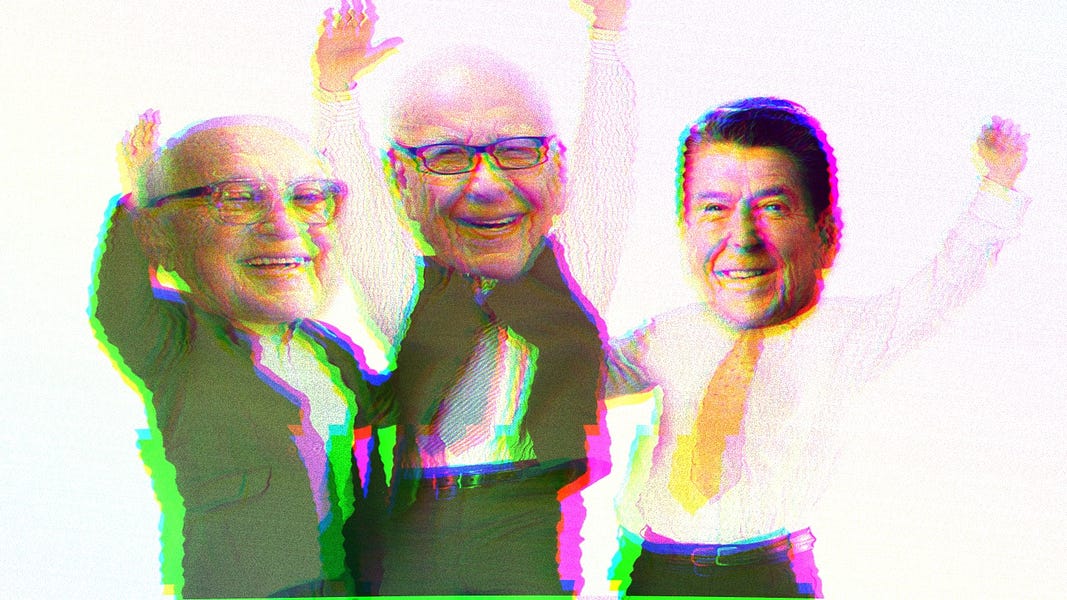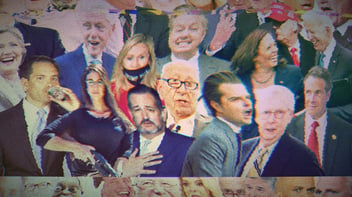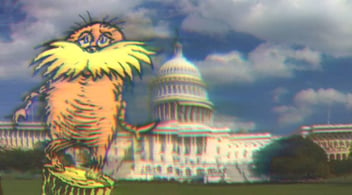1 Year Anniversary: Look Back, Go Forward
 Image Description: Composite of Milton Friedman, Rupert Murdoch and Ronald Reagan.
Image Description: Composite of Milton Friedman, Rupert Murdoch and Ronald Reagan.
Heading into the change of seasons, I wanted to use our one year anniversary as an excuse to reflect, as well as project. Today, we’re going to examine some of the broader themes that we’ve teased out together over the past twelve months, and chart the path forward so we can set expectations.
The first draft of the show was in the summer of 2020, at the height of the pandemic. It was a scary time for all of us and a period none of us would like to revisit anytime soon. These periods, however, have a tendency to inspire, partly out of fear and partly out of a desire to change one’s circumstances. Like most of you, that’s where I was in mid-2020 when I started formulating the show.
Here’s where I got really lucky. I happened upon Tom McGovern, who is responsible for all of the original music in our show, and he delivers every time. I was already connected through prior experience to Manny Faces, whom I consider to be one of the best producers in the industry. And I worked alongside the extremely talented and thoughtful 99. I had access to some really incredible colleagues and was able to bounce ideas off of them, and I have a supportive family. Without these ingredients, I’m just a guy blabbing into a microphone.
At the time, the country was also in the waning stages of the Trump administration—though it was unclear whether it was the end or simply the middle. In fact, we were initially targeting to launch the show in January of 2021. But in the event we someday gained a following and people dug our take on the world, I wanted a time stamp of sorts, to get something out before the election to stake a claim and show where we stood.
So we sort of rushed to get the first couple of shows out to piss on our corner of the world and mark our territory. This wasn’t going to be a Trump bashing show. We didn’t want to align by party affiliation. And we weren’t going to wade into current events or drink from the firehose of discontent that signified this period. Instead, we were going to take our time and embark on a hopefully long journey together toward understanding the American experiment a little better. And, though we see the world from a progressive perspective, it’s one that’s more pragmatic than dogmatic.
I mapped out about six months worth of topics and committed to two things. One, I would get through all of them and pour my heart into writing them, trusting that Manny and 99 would elevate the show and support me in putting it together. And, two, when I felt like we were in a rhythm, I would spend a specific budget on promoting the show to see if we had something special that added to the national discourse and not just the noise.
This brings me to something you’ve heard me mention before, but bears repeating.
By January of 2021, we had covered a few topics that I felt were important in setting the groundwork for UNFTR. The federal budget, the military, corporate propaganda, capitalism, a Trump episode and one on objectivism called Ayn Rand was a Dick. But it wasn’t until the Beatification of Ronald Reagan that I really felt like we were in a groove. We’d developed a voice of the show, a semblance of structure and we were beginning to inject some satire into the production.
I sent out a slew of requests to other podcasts that we had been cultivating and researching since even before the show launched. One after another, we were turned down. And some of these were friends of mine. To be clear, I wasn’t looking for freebies. I know how hard it is to build an audience, so I wanted to respect this and pay for the privilege of introducing UNFTR through other shows. If the numbers didn’t improve, or if they spiked then dropped again and no one stuck with it, then I would have my answer and could go back to toiling in obscurity.
The only problem was, no one bit. One by one, the responses came back negative. “It’s not for us.” “Host turned it down.” Or no answer at all.
The only person to answer was Jay from Best of the Left. “Sounds like it’s right up my alley. Happy to help.” That was his first response. I had known Jay from another project a few years back, but nothing that would warrant the amount of love and attention he showed me from this point forward.
He gave us a friends and family rate to help us get off the ground. Suggested we take it slow. Gave us insight into how to best craft an advertisement and took the time to listen to our initial shows, offer feedback and even some advice on how to run a show from a business perspective. The amount of information and insight he gave me in those initial weeks, and in fact ever since, could never approach a fraction of the investment we made into an ad campaign. And then, he reached out to his friend David Pakman and introduced our show to him. And then again to The Young Turks. If you follow our show, it’s very likely that you came from one of these places. So, if Jay wasn’t willing to take a chance on me, it’s likely we would never have met Unf*ckers.
Doesn’t matter who you are. In life, in business, there are people who got us to where we are. And that’s why, one year into this amazing journey, I have to start by thanking the people whose shoulders I’m standing on.
Building Blocks
We started with a promise to show how we’re fucked in ways we haven’t really considered. That’s the underlying premise of the show. Evaluating policies or events that have somehow contributed to our current situation, and presenting it in such a way that we can wrap our minds around it or develop a new shared language. In our minute-to-minute, 24/7 consumption culture, sometimes we lose the plot and rely on the last line of a narrative to identify our feelings about a person, a party or policy. To somehow break away from identity politics and reframe critical issues that pertain to our democracy.
So we set the table early on with a budget episode that breaks the federal budget down into bite size chunks to talk about how we raise money, where it goes and who decides. One of the areas of attention was on the military budget, which makes up more than half of the discretionary spending each year. We used that knowledge as a springboard to talk about how we slowly militarized domestic law enforcement over the past few decades to extremes found mostly in authoritarian nations. And we used these examples to tee up the next episode on American style propaganda to show how these developments that would have seemed downright preposterous to any American prior to the 1970s have been packaged and normalized over time.
These were the three main building blocks I wanted to lay down prior to the election to explain what this show was about in the event, I don’t know, something fucked up happened and everything changed.
But, everything went pretty smoothly after the election, so there wasn’t much to comment on! So we got back to business. No riots. Peaceful transition of power. The whole thing.
The goal was to keep hitting on big themes, showing how things overlap and ultimately gather support and become policy. I always refer to them as building blocks, and I think that approach has served us well, because sometimes it’s really difficult to explain why fucked up things are the way they are.
Take, for example, a throwaway line most of us have likely heard: “Ronald Reagan destroyed the middle class.”
The left just sort of takes this as gospel, and the right obviously thinks Ronald Reagan walks on water and literally lifted America from the ashes of the Carter administration to the heavens.
I think that’s why the Reagan episode was really our coming out show. In the budget episode, we were able to show how our priorities changed dramatically over the past half century. From here, we were able to explain why and how the military funding grew to such an enormous degree, beginning under Reagan and at the expense of social welfare programs. And in the domestic law enforcement episode, we explained how Reagan created the funding and pathways to militarized local police forces and outfitted them with military grade weapons and training.
By setting the stage for these big ticket items, we were able to focus on very specific financial con jobs Reagan pulled off, from increasing taxes on the middle class eleven times during his terms to increasing social security deductions and placing a cap on them, which essentially turned it into a regressive tax.
Reagan didn’t wave a magic wand and fuck the middle class. He did it by lying and deceiving the public through propaganda.
There were a couple of other building blocks that we laid down before the Reagan episode, as well, that are more what I consider ‘unf*cking adjacent’. These are topics that are outside of socioeconomic and political arenas, but related enough that they contribute to the public sentiment that allows for horrible policies to not just be adopted, but accepted or even lauded.
For example, in preparation for the Reagan episode and others since, we did a show specifically on the theory of objectivism and the influence of Ayn Rand. In modern politics, Ayn Rand had a resurgence of interest during the Obama years when Paul Ryan looked like he was the future of the Republican party. Ryan was a devotee of Ayn Rand, along with others like Ted Cruz and Kevin McCarthy.
But before this new wave of shitheads, the original cult followers of Rand were actually more dangerous and in positions of great authority. Such as Alan Greenspan, who factored heavily into the Reagan episode. Understanding how this tiny, chain smoking Russian atheist who hated feminism, FDR and pretty much everything else created a philosophy that inspired the likes of Greenspan helps explain why they behaved as they did.
Then we followed this show with an episode on the evangelical wing of the Republican Party to explain how supposedly Christian people would buy into policies that literally take from the poor and give to the rich. So, in our Prosperity Doctrine: Christ as Capitalist episode, we charted the evangelical journey in America from the 1920s through to today to figure out how this bizarre doctrine of faith became aligned with republican values.
Now, put together the warping of Christianity with Ayn Rand’s objectivism, and you get the doctrinal elements of the modern Republican Party and the ability to explain in detail just how Ronald Reagan did fuck the middle class.
And that’s how we do the voodoo that we do.
Fucking Milton
So, as most Unf*ckers know, Ronald Reagan wasn’t going to be the only one in our sights. There was a bigger nemesis on the horizon. Milton Fucking Friedman.
A handful of non-unf*ckers have come out of the woodwork to criticize our take on Milton Friedman, and perhaps there would have been more, had we not carefully laid out the argument over several episodes that the policies crafted by Friedman and his colleagues in the Chicago School contributed to the deleterious rise of neoliberalism.
Over the course of several episodes, we made the case that from Nixon forward—with an all too brief respite in the Carter years—the theories of the Chicago School economists paved the way for some of the more disastrous policies in the United States, from social welfare and criminal justice reforms to the impact on climate change.
By detailing the harmful and lasting effects of the Reagan era, we were able to shift gears and begin chipping away at Friedman’s legacy, before going for a full Unf*cking in what remains our number one downloaded episode, F*ck Milton Friedman. With the Reagan years under our belts, and understanding how the Christian evangelical and objectivism movements allowed for the mental shift in the country toward an anti-welfare, anti-government, anti-regulation sentiment, we introduced the insidious impact of corporatism in our governance and our daily lives.
The Mass Incarceration episode spoke to the rise of the prison industrial complex through privatization and legislation that criminalized poverty and blackness in America. And we drew a straight line from the Chicago School to this phenomenon taking root, though I will admit that this was not the line that Friedman intended. I’ll get to that in a second.
After that, we did our first two-parter on corporate America and how deregulation fueled the insane accumulation of power and access to the levers of government in America. We concluded the buildup to the F*ck Milton show with an episode called The Problem with Conscious Capitalism to dissuade anyone from the notion that capitalism possesses the inherent ability to fix itself for the benefit of society as a whole.
And then, we got after it.
The FMF hashtag caught fire with the release of our F*ck Milton Friedman episode, where we spent the first half actually talking about the man Friedman would be contrasted with his entire career, John Maynard Keynes. Keynes was the field of economics from World War One clear through to the 1960s. He towered over the discipline for half a century and is still mentioned in the same breath as Karl Marx, Adam Smith and David Ricardo in the pantheon of great thinkers in economics.
Friedman and his colleague Friedrich Hayek—who, in many ways, is more beloved by Libertarians even today—established the Mont Pelerin society as a free market liberalism think tank that grew ever more dogmatic in its approach to capitalism.
For years, the Chicago economists generated theories that chipped away at Keynes’ legacy, but it wasn’t until the stagflation crisis of the 1970s that the developed world heaved Keynes out the window rather unceremoniously and rolled out the red carpet for Friedman, who had established himself as the alpha in the field of economics. In this, and subsequent episodes, we have returned to these brief but crucial years, as they sent the pendulum flying to the right and ushered in a wave of reform that we have been suffering under since the early 1980s.
As our foundation grew and we began to hone in on certain themes, we made sure to pull back and broaden the lens periodically to see how our domestic transition was impacting the rest of the world.
We examined the U.S. policy toward Cuba, which grew from a strictly Cold War rationale to adopting the neoliberal perspective without blinking. We peeked in America’s attic to do a full fledged ‘merica-splaining episode of Canadian politics and showed how they suffer from the same neoliberal tendencies as we do, though their conversations are slightly more elevated and honest than ours.
In our 9/11 episode, we traced the roots of this tragic crescendo back to the original 9/11 when the U.S. facilitated the assassination of Chilean President Salvador Allende and cleared the way for a different kind of Latin American intervention. And, most recently, we covered the Washington Consensus, which was a white paper authored by John Williamson describing the U.S. policy toward the whole of Latin America and the Caribbean since the Mexican Debt Crisis in 1982. The majority of these policies can be wholly contributed to the thought experiments of the Chicago School and the Mont Pelerin Society. A straight line if ever there was one.
Which brings me back to what I said earlier about trying to draw straight lines from Milton Friedman’s concept of economic liberty and free markets to the policy agenda of the United States, from mass incarceration to foreign interventions.
Whenever we talk about Milton Friedman, I try to make it abundantly clear that the man himself wasn’t evil. He was a true believer in the power of free markets and actually not mean spirited. He is often rebuked by the left for the horrible outcomes of his policies, but in many cases, the policies themselves were either perversions of his philosophy or lacked the nuance to be true to form.
My problem with Friedman and why I still say “fuck him,” is because he lived long enough to see his theories bastardized and, rather than say that maybe his purist vision of the free market was impossible to fit into the real world, he simply said everyone was doing it wrong. His ego couldn’t allow for the possibility that free markets are, as Bernard Harcourt points out, an illusion.
Friedman popularized the phrase, “there’s no such thing as a free lunch.” But the conclusion that we attempted to draw throughout these episodes is that the real sentiment is “there’s no such thing as a free market.”
Changing the Narrative
We’ve covered a lot of ground in just a year together, but the two shows that are most meaningful to me so far are the Culture Cancel episode on the American holocaust of Indigenous people and the Economics of Racism. I feel like these encapsulate how exactly policy, be it military, legislative or economic, can be weaponized against marginalized communities.
What’s so fascinating about the United States is that we objectively have good bones. The constitutional framework, separation of powers and abundant resources lay the groundwork for a remarkable republic. And yet, somehow, we have shown everything from incredible indifference to outright resistance to change. Those who have controlled the mechanisms of power throughout our brief history have used them in such horrifying ways, it should shame us all.
And yet we have also been imbued with the ability to look past those who are less fortunate, no matter what’s engraved at the foot of Lady Liberty. We simply don’t see ourselves clearly.
We talk about freedom, but live under the constant threat of insolvency.
We talk about opportunity, and yet most of us will do less well than our parents, real wages for 90% of the nation haven’t moved since the late ‘70s and we’ve erected structural barriers to prevent mobility for people of color from inception.
We talk about bravery, and yet we bully the world through sanctions, invade foreign nations whenever and wherever we please, plunder the resources of the world, veto human rights provisions at the United Nations and we literally tried to stamp out an entire people within our own borders. Nothing about this is brave.
We have to change the story. The fairytale we tell ourselves about the home of the free and land of the brave is just that, a fairytale.
It’s one of the reasons I talk so much about language. Changing our story means changing the narrative. And that means learning a new language. As we spoke about in our LGBTQ episode, we can’t live the change until we can speak it. It’s why we covered the anniversary of Occupy Wall Street and determined that the real legacy of Occupy was how it gave us the vocabulary of inequality. For the first time since the New Deal, we began to see things from the viewpoint of the 99%. We called our corporate masters out on the carpet and issued a declaration of no more.
It’s why we dissected the impact of nefarious figures such as Rupert Murdoch, a man with power and no ideology. A man who profits from dissent. It’s why many of the takeaways that we call our Tyson Principle revolve around the concept of language. History does repeat itself if we fail to recognize it.
The Tyson Principle is named for the first listener to reach out and challenge us not to simply lay out the problem, but to lay out the prescription. And the prescription for our illness begins with learning how to see it, how to spot the issues that plague the republic and frame it in a way that provides clarity. How can you know where you’re going if you don’t know from whence you came? That, if anything, was the central theme of our first year.
And so, my fellow Unf*ckers, a few final thoughts as we put the first year behind us or as the great New York Mets announcer Howie Rose says, “Put It In The Books!”
MANNY: Oh god. Please don’t reveal that you’re a rabid Mets fan. People were just beginning to like you.
I am what I am, Manny. Miami Vice, New York Mets. The Bogmen. All part of the basic white guy formula, baby.
Looking Forward
There’s a shift beneath us. In case you missed it, the progressives have found their mojo. That’s not to say we’re in the driver’s seat, there’s a long way to go; but the past few weeks have been illuminating. In the ‘90s, there were 10 members of congress in the progressive caucus led by a man named Bernie Sanders. Today, there are 96. We’re going to talk a lot about the progressive movement in the year ahead, beginning with next week’s Quickie. There’s a lot to be psyched about, although as we noted in our Climate Industrial Complex episode, it’s already too late on several fronts.
And there’s another trend, this one related to where we are right now, that I don’t love. And that’s the splintering among progressive figures. We’re used to Democrats eating their young, but progressives have long been united because of their extreme minority status. But now that the left wing of the party is gaining momentum, egos are beginning to take hold, and the knives are out. Something to watch for.
So here’s what’s planned for the next few months. We’re going to talk about progressive politics, do a little analysis of ISMs that guide our politics, look beyond our borders to foreign interventions past and present and try to predict what happens next. We’ll continue down the economic path to explore the world of commodities, such as oil and gas and precious metals. Ponder a meatless future, unf*ck Hollywood’s impact on the American psyche and get to the root causes of immigration and asylum seekers, all in an effort to learn more about ourselves, refine our shared language and build toward an equitable future. One unf*cking great episode at a time.
In the meantime, thank you to all of the Unf*ckers, Subf*ckers, Eurof*ckers, UnCanuckers and Down Under F*ckers for making this an extraordinary first year. Thank you for sending so much love to Manny and 99 in recognition of their extraordinary talents. Fuck Milton Friedman, Rupert Murdoch, Ronald Reagan and all the fuckers we’ll unf*ck in the coming years together.
Here endeth the masturbatory exercise in self-aggrandizement.
Max is a political commentator and essayist who focuses on the intersection of American socioeconomic theory and politics in the modern era. He is the publisher of UNFTR Media and host of the popular Unf*cking the Republic® podcast and YouTube channel. Prior to founding UNFTR, Max spent fifteen years as a publisher and columnist in the alternative newsweekly industry and a decade in terrestrial radio. Max is also a regular contributor to the MeidasTouch Network where he covers the U.S. economy.


